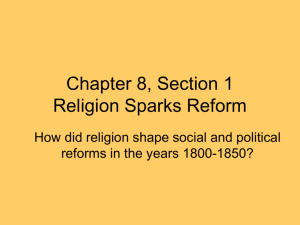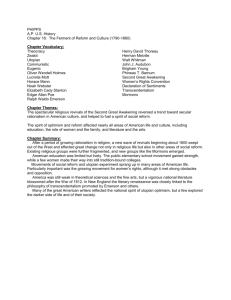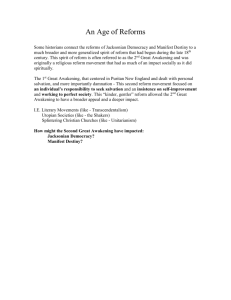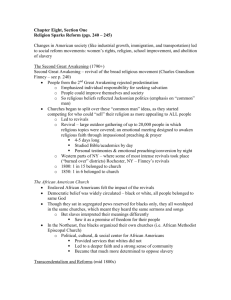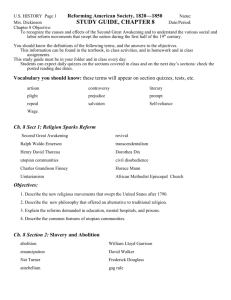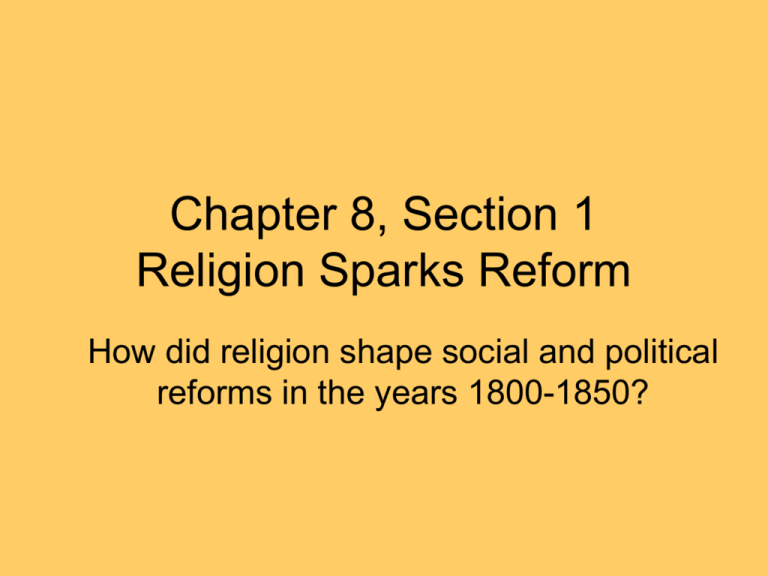
Chapter 8, Section 1
Religion Sparks Reform
How did religion shape social and political
reforms in the years 1800-1850?
• CHAPTER 8, SECTION 1
• The spirit of optimism and reform affected
nearly all areas of American life and
culture, including education, the role of
women and the family, and literature and
the arts.
Second Great Awakening
1790-1830’s
Impact of the American Revolution on Religion
Rejected: Predetermination of Calvinists and Puritans
Embraced: Democratic and Individualistic Ideals of the
Revolution.
RESULT: Individuals may reform themselves to
achieve salvation and may reform society.
Second Great Awakening
Revivals were the means by which the
Second Great Awakening Spread.
Revivals were the site of impassioned
preaching, usually in tents or halls, to
awaken faith and spark conversion.
http://www.gprep.org/~sjochs/reform-revival.jpg
Revivalism and Class
Revivals are:
• More common on frontier, South and West
• Less common among elites
• Creates more democratic churches, i.e.
Methodists, Baptists, Adventists, etc.
• “Canary” for societal attitudes toward slavery
Churches Split Parties Split Union Splits
Charles G. Finney 1792-1875
• Most famous preacher of the period.
• Urged “Christian perfectionism”
• Worked in Rochester, NY 1830-31, AKA “burned over district”
http://www.oberlin.edu/external/EOG/images/CharlesGr
andisonFinney.html
Counter-Reaction
to the 2nd Great Awakening
Unitarianism: Emphasizes use of reason
and conscience, not emotion, as means to
reform and conversion.
Urges members to reform society.
Leader: William Ellison Channing
Transcendentalists (1830’s)
TRUTH IS NOT OBJECTIVE ALONE –
DISCOVERED BY “INNER LIGHT”
Individualism, Self-reliance, Self-Discipline
• Ralph Waldo Emerson, essayist
• Henry David Thoreau
– Walden
– Civil Disobedience
• Walt Whitman
– Leaves of Grass
Transcendentalism
A Philosophical and Literary Movement
Emphasizes: simple life, truth found in nature,
imagination and art
Ideals: individualism, freedom, self-reliance
Ralph Waldo Emerson: founder and leader
Henry David Thoreau: Reformer
Wrote Walden and Civil Disobedience,
Later inspires Ghandi, Martin Luther King, others
Civil Disobedience
A minority is powerless while it conforms to the
majority; it is not even a minority then; but it is
irresistible when it clogs by its whole weight. If the
alternative is to keep all just men in prison, or give up
war and slavery, the State will not hesitate which to
choose. If a thousand men were not to pay their tax
bills this year, that would not be a violent and bloody
measure, as it would be to pay them, and enable the
State to commit violence and shed innocent blood.
This is, in fact, the definition of a peaceable
revolution, if any such is possible.
African American Churches
• Bethel African Church
founded by Richard
Allen in Philadelphia.
• Evolves into the
African Methodist
Episcopal Church
(AME).
• Site for education,
community, and
political organization.
• Calls for reform and
abolition.
School and Prison Reform
Jacksonian Democracy and Growth on Frontier
spurs expansion of public schools.
Horace Mann – establishes and reforms public
schools system in Massachusetts. Model for
most of US.
Dorothea Dix – Reforms prisons & asylums
Reformed care of mentally ill in South 18451852
Alexis De Tocqueville -1831, criticizes US
prisons, spurs reforms. Goal of prison
changes: Reform, not Punish.
Religious and Utopian
Communities, 1800-1845
• Brook Farm – Founded 1841 to “prepare a society of
liberal, intelligent, and cultivated persons.”
Destroyed by fire in 1845.
• Religious motives dominated the founding of Shaker and
Mormon communities.
• Ideas of Robert Owen & Frenchman Charles Fourier, who
sought to cure the evils of competitive society by establishing
a harmonious world, influenced communities like Modern
Times on Long Island and the North American Phalanx at
Red Bank, New Jersey.
• Noyes's Oneida mingled religious and secular motives in
ways hard to disentangle
Map: Religious and Utopian Communities, 1800-1845
Copyright © Houghton Mifflin Company. All rights reserved.

